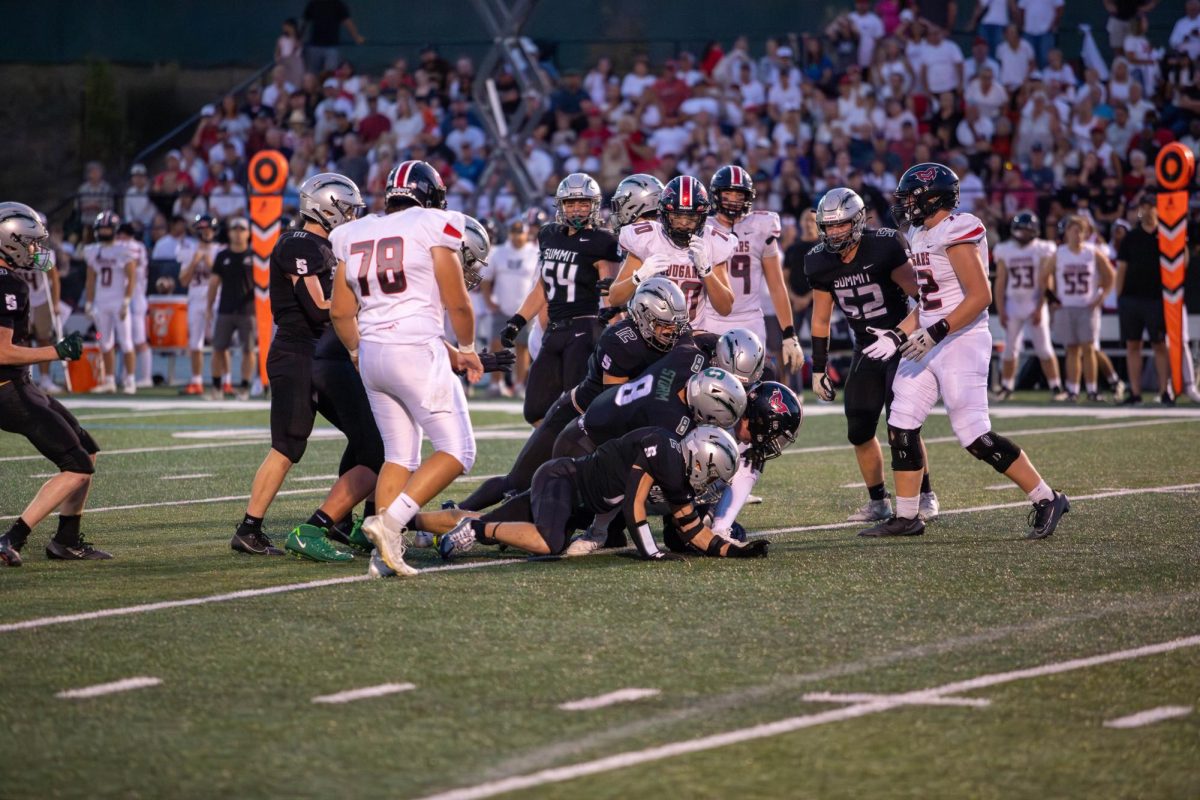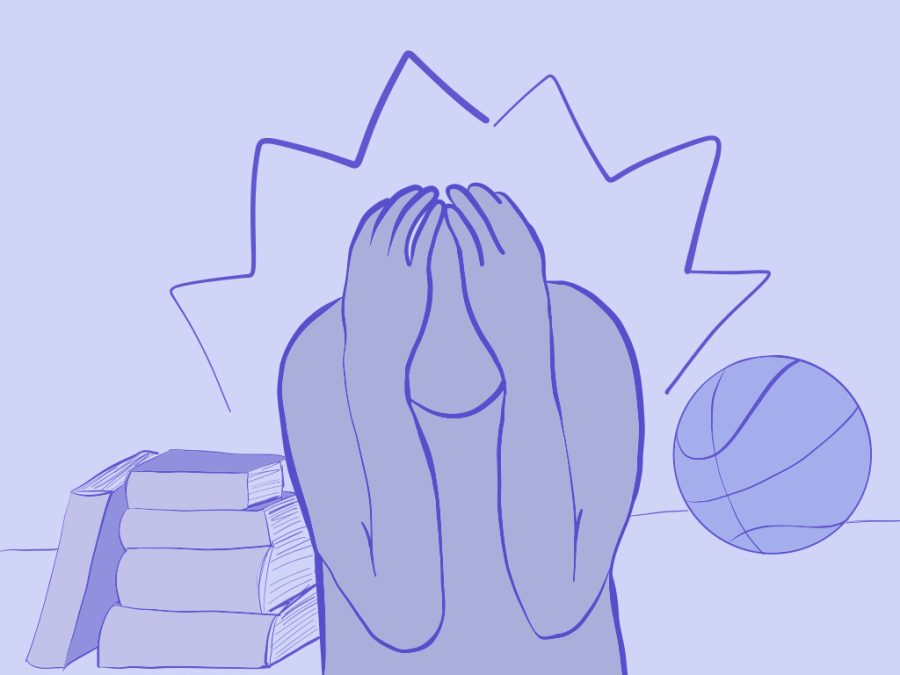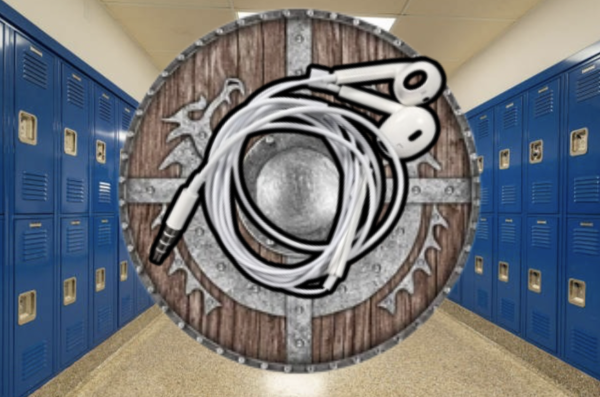The Rise of Schedule Stacking
Is overpacking your agenda a good choice?
During last February’s forecasting season, I found myself at a crossroads. Rather than choosing to take just a few more difficult classes next year, I packed my senior schedule full of AP and college-level courses. All of these pile on top of sports practices, club meetings and two part-time jobs. This is by no means new for me; I have made similar overwhelming mistakes all throughout high school, driven by a desire to do the most.
Like many other high school students both at Summit and across the country, I have fallen victim to overpacking, or stacking, my schedule. Generally, senior year is considered to be an “easier” year in terms of workload, and often, students will choose to take fewer classes and enjoy the end of high school. However, instead of allowing myself a break next year, I chose to partake in everything I possibly could, hoping to impress colleges and seem like a “dedicated” person.
Simply getting A’s in core classes and playing a sport is no longer sufficient for admission to selective schools; colleges want to see the most. Admission to the “select” colleges, including the elusive Ivys, depends on everything—ranging from SAT scores and stellar report cards to community service and leadership positions. When choosing their prospective students, colleges want to see individuals who are truly the pinnacle of their competitors.
A large contributing factor to this issue is AP classes, which allow students to learn college-level material in high school. The benefits of APs are numerous: the classes are rated on a 5-point scale, thereby raising students’ GPAs, which impresses colleges significantly. Students who take these courses are also able to take comprehensive AP exams in the spring, which grants test-takers college credit for a significantly smaller cost. AP classes have gained popularity in the last decade; 1.3 million American high school students took the tests in 2006, a number that has more than doubled since then. With so many students taking APs, the pressure to participate in more and appear unique to colleges is ever-increasing.
Most students also participate in lots of extracurriculars—ranging from clubs to sports and volunteer work. Summit students alone have created and joined more than 100 clubs and sports teams. But simply coming to one or two club meetings a month isn’t enough to impress; often, schools want to see students who have held leadership positions in clubs, thereby contributing to their communities in a more meaningful way.
“There is so much pressure on students to be ‘perfect’ in literally every regard: all A’s, club president, sports team captain, you name it,” said junior Audrey Marx, who balances an internship and two clubs, as well as her position as one of the yearbook editors. When choosing her junior year courses, she said she was encouraged to take more difficult options and impress schools. “I think the pressure of wanting to get into a good college and thinking that’s the only way to do so can be debilitating honestly.”
Stacking schedules can lead to some serious issues—the main one being a lack of sleep. Although high school students are recommended to get at least 9 hours of sleep, Nationwide Children’s reports that most can only fit about 7 into their busy days.
“Something I think about quite often is the sleep habits of students. We know that having quality sleep is crucial for managing stress, overall energy levels, focus [and] mood stabilization,” said Summit counselor Alyssa Doan. “This goes for students and adults, but if we pack our schedule too full without creating boundaries to make space for self-care then we will experience burnout, anxiety [and] stress.”
With a rise in schedule stacking comes a decline in health, both physical and mental. Simply put, there just isn’t enough time to participate in all these activities and courses while taking time for self-care. And without adequate time to relax after stressful days, mental health declines.
“It is a common observation amongst teachers and staff that students are struggling more and more with managing their stress and anxiety. Self-care isn’t always just watching a show, but it can quite literally be taking time to focus on the basic needs such as sleep, nutrition and movement,” Doan said. She has noticed that students who fill their schedules to the max often favor homework over basic needs.
“I do often feel stressed but I try to push through by hoping that it’s all worth it and that studying will pay off and taking AP classes will prepare me for college,” Marx said. She is taking five AP classes this year. “It’s been hard to recognize my limits, but that is something I’ve tried to do, because at the end of the day, you can’t do it all and I do feel like it’s more important to prioritize your well-being.”
Other students are influenced by their classmates’ decisions to take harder classes and join more extracurriculars, leading them to do the same.
“Since I started high school there has always been a pressure to take difficult courses and participate in extracurricular activities in order to be a competitive candidate for the more selective colleges…I definitely joined them with the idea that they would look good to colleges in the back of my mind,” said senior Madison Ruff, who is currently taking five AP classes, while also climbing competitively and participating in both Interact Club and the Science National Honor Society.
However, even with impressive academic and extracurricular resumes, students aren’t guaranteed to get into their top colleges. Admissions are often variable, and although a good GPA and heavy activities list can get students past initial barriers, everything depends on admissions counselors’ final opinion.
“I have gotten into my top choices of selective schools so I do think [my classes and extracurriculars] helped me, but, honestly, sometimes the acceptances to schools seem pretty random,” Ruff said. “I know lots of really smart, really involved individuals who were overqualified for a school but got rejected. I think the classes and extracurriculars matter, but, at the end of the day, all you need is one admissions person to read your essay and really like what you’re saying, and you’re in.”
Every year, students applying to schools produce nearly identical applications—everyone is “virtually” the same, leading to more lottery-based decisions. Standing out isn’t always easy when every applicant has an extensive list of activities and classes they’re participated in, too, so students should direct their focus to one or two things they care about rather than running the gamut of commitments.
“I think a common message that is unanimous amongst the counseling department, as well as college admissions, is that they value quality over quantity,” Doan said. “It’s not about how many clubs you are a part of or how many AP classes you take, but rather it is more impactful to take on a couple [of] clubs and show commitment to those clubs over the course of your high school career.”
Instead of filling schedules with difficult commitments, she recommends impressing college admissions officers through a few, select options. Doan also encourages students to take on as much as they are comfortable with doing, rather than being influenced by other students’ packed schedules.
“I do not think it is worth the trouble of comparing yourself to what others are doing and rather it is more important to spend your energy focusing on how you can find the best version of yourself,” Doan said. “It is always important to challenge ourselves, but if it is at the expense of running yourself into the ground, then I would ask if you are really giving an accurate portrayal of your strongest self.”
So, is devoting all that time to looking impressive for college really worth the struggle? That depends. Some students, like Ruff, feel as if their impressively-scheduled resumes made a difference in college admissions, but for others, that may not be the case. When choosing classes and commitments for the next school year, it’s important to consider whether or not the time and effort they require will reap the benefits.

When she isn’t busy catching grammar errors and writing pieces for the Pinnacle, Opinions Editor Lina McDonald can almost certainly be found drinking copious amounts of coffee and wandering around Dudley’s...



































